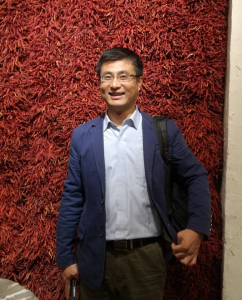
songqingli@um.edu.mo
Tel
(853) 8822 8245
Office
E21-4077
Consultation Hours
LI Songqing
Introduction
Short Li is a socio-applied linguist with research interests in bi/multilingualism, discourse analysis, sociolinguistics, and linguistic anthropology.
Education
He received his MA in in Linguistics, Society & Culture from University of East Anglia (UK) and his PhD in English language from National University of Singapore.
Research Interests
bi/multilingualism, discourse analysis, English as a global language, sociolinguistics, and linguistic anthropology
Short is happy to supervise research projects related to his research interests. His publications can be found in the flagship journals in the area of socio-applied linguistics, such as Applied Linguistics, International Journal of Multilingualism, Social Semiotics, Semiotica, and World Englishes.
- Liu, J., & Li, S. (accepted). Unequal Englishes, native English speaker teachers and social variables: An intersectional approach. In Ruanni Tupas (ed.), Investigating Unequal Englishes: Researching and Analysing Inequalities of the Englishes of the World. Routledge.
- Li, S. (accepted). English-language advertising in East Asia. In Kingsley Bolton (ed.), The Wiley Blackwell Encyclopedia of World Englishes. Wiley-Blackwell.
- Li, S. (2023). The politicization of place: Chronotopes, authenticity, and semioscaping Fujialu as a site of “red tourism” in China. Social Semiotics. doi: 10.1080/10350330.2023.2216636.
- Li, S. (2023). Digital remediation and visual manipulation: Blogs as breathing spaces for Chinese tattoo wearers and enthusiasts. Digital Scholarship in the Humanities. 38(3): 1145-1157.
- Li, S., & Yang, H. (2022). Semiotic practices, identity and power: Linguistic landscape at the airport in Shanghai. In Seyed Hadi Mirvahedi (ed.), Linguistic Landscapes in South-East Asia: The Politics of Language and Public Signage in South East Asia, 162-184. Routledge.
- Li, S. (2022). Linguistic creativity and language commodification research: An intersectional perspective. In S. Li (ed.), English in China: Creativity and Commodification, 17-31: Routledge.
- Li, S. (ed.) (2022). English in China: Creativity and commodification. Routledge.
- Li, S., & Yang, H. (2021). ‘Open’, ‘connected’, ‘distinctive’, ‘pioneering’ and ‘committed’: semioscaping Shanghai as a global city. International Journal of Multilingualism. doi: 10.1060/14790718.2020.1865970.
- Li, S. (2019/2020). Identity Constructions in Bilingual Advertising: A critical analysis (hardback/paperback). Routledge.
- Liu, J., & Li, S. (2019/2023). Native-Speakerism in English Language Teaching: The Current Situation in China (hardback/paperback). Cambridge Scholars Publishing.
- Li, S. (2019). Expanding the scope for research on global English-language advertising. World Englishes, 38: 159-534.
- Li, S. (2019). Intertextuality as a strategy of glocalization: A comparative analysis of Nike’s and Adidas’s 2008 advertising campaigns in China. Semiotica, 230: 495-514.
- Li, S. (2017). Identity constructions in bilingual advertising: A critical-cognitive approach. Applied Linguistics, 38(6): 775-799.
- Li, S. (2016). English, advertising, and positioning: The impact of English on Chinese people’s daily lives. Journal of World Languages, 2(2/3): 77-93.
- Li, S. (2015). English in the linguistic landscape of Suzhou. English Today, 31(1): 27-33.

